So F. Scott is blogging every so often about his current experiment with this focus, form, frame framework. He's got me thinking about how to apply this to one of my classes, starting next week when we launch into a new unit reading a nonfiction book together.
The thing is that this framework is very much in line with what I have been working toward as a teacher for years. I have taught very much in this way before--had my AP Lit students in a previous school coming up with discussion topics for our novels and facilitating discussions. Had my Advanced Comp students making more of their own decisions about which modes of writing to study when depending on what angle they wanted to take in responding to a particular topic. Even had them determine our list of topics for a semester.
Even in my current school where F. Scott and I teach, I started out in my first year (I'm now in my third year there) intending to do even more of the kind of teaching I had been working toward where I would involve my students in as much decision making as possible about the what, when, how of our classroom. I believe strongly that we teachers should turn over decision making to our students whenever we can in an effort to more fully engage them in what happens in our classroom. Why should I be the one spending hours with a novel or short story deciding how to engage my class in a discussion of it? Can't they do some of this work? And wouldn't they get something significant out of it?
But pulling off this model in my current school turned out to be quite difficult on many levels. The student population F. Scott is working with on this (extremely motivated advanced level students) is not the same population I attempted it with (not as motivated regular track students). There were also some issues surrounding me as a new person in the building trying to enact something that went across embedded and sometimes unspoken norms about teachers' roles, students' roles, what happens in language arts classrooms, etc. My desire to share authority with my students in my classroom in ways that would work to really engage them in what we were doing was uncomfortable for some of my colleagues.
So in short, I strayed from my roots so to speak. And F. Scott is reminding me of that.
Next week I will attempt to get back to that. I'll start off with a blank 4-week calendar, a book, and a frank discussion with my seniors about their stances toward reading in school. We'll talk about procedural display, what it looks like, why we want to avoid it, how we can inspire them to work to avoid it. I'll ask them what they need in order to want to read the book (some of them have already told me that they have read not one single book in their years of high school language arts classes). Our focus will be the text as it pertains to the big essential question for the course, the frame will be four weeks, and the form will be two-fold: a compare/contrast paper (an agreed-upon assessment for the course) and a group presentation about an issue connected to the text. Other than that, they'll have to help me figure out the details: do they want reading quizzes to motivate them to read? Do they want lots of discussions in class? When should the paper be due? How much in-class time do they want to work on it? When should we watch the film interpretation of the text (if they want to watch it)?
I really believe that just engaging them in the conversation is powerful. My dad always taught me that people have the right to a say in decisions that affect their lives. If I want my students to engage in my course in such a way that it does have some meaningful effect on their lives, don't I owe it to them to help me figure out how to make it some worth their effort and engagement?
The Felonious Trump Legacy
6 hours ago

